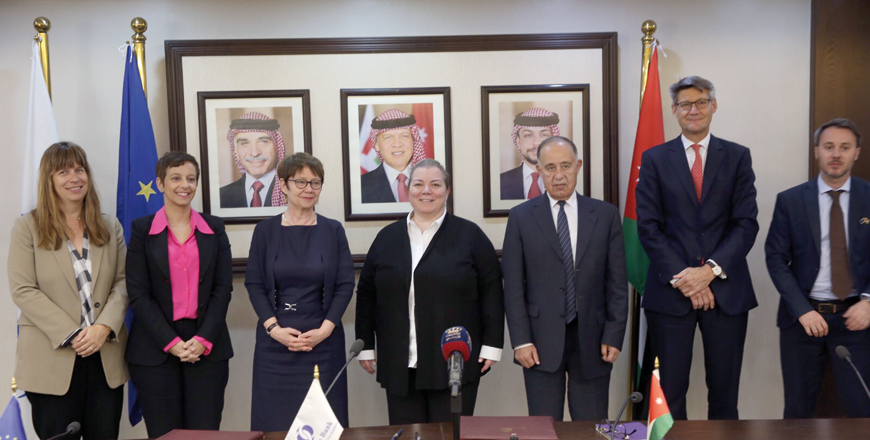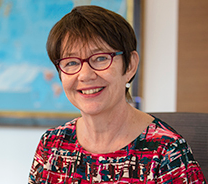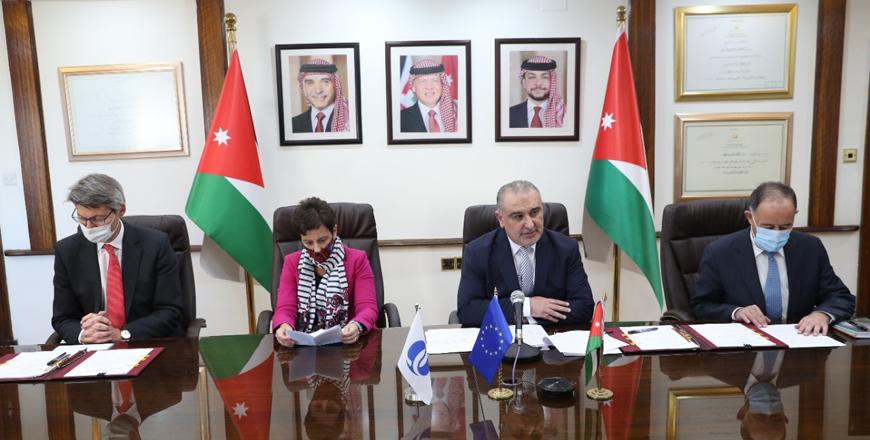You are here
Jordan, EBRD sign 30-million-euro agreement to construct water treatment plant in Al Ghabawi
By JT - Mar 28,2023 - Last updated at Mar 28,2023

Officials pose for a photo during the signining of an agreement finance the construction of a greenfield wastewater treatment facility in Al Ghabawi in Amman on Tuesday (Photo courtesy of Planning Ministry)
AMMAN — The Ministry of Planning and International Cooperation on Tuesday hosted the signing ceremony of an additional grant from the European Union, through the European Bank for Reconstruction and Development (EBRD), valued at 30 million euros to finance the construction of a greenfield wastewater treatment facility in Al Ghabawi on the outskirts of Amman.
Minister of Planning and International Cooperation Zeina Toukan noted that the funding for the project amounts to 71.3 million euros, with the grant contributing 30 million euros, and the remaining 41.3 million euros will be secured through a soft loan from the EBRD, according to a ministry statement.
The minister added that a modern wastewater treatment plant in Ghabawi will improve the level of services provided to citizens and develop the water and sanitation system, which align with the government's priorities in the Executive Programme 2023-2025 of the Economic Modernisation Vision.
The new facility will replace the existing one in Ain Ghazal, which is harming the environment and causing a nuisance to the surrounding communities, the EBRD statement said.
The Al Ghabawi facility will treat septage collected from areas in Amman that are not connected to the sewerage network. This will help eliminate odour, noise pollution and traffic problems due to septic tank truck movements around the current facility in Ain Ghazal.
Jordan is one of the world’s poorest countries in terms of water resources, and dry climate conditions have created severe water shortages. And with the country’s population continuing to grow rapidly, in addition to the influx of 1.3 million Syrians living outside of refugee camps, there is unprecedented stress on existing infrastructure and municipal capacities, the EBRD said in the statement.
The financing will also help provide on-site training and employment opportunities for up to 100 unemployed youth and women in the community while the facility is being built, the EBRD said.
The agreement was signed by Toukan on behalf of the government and EBRD President Odile Renaud-Basso in the presence of Water Minister Mohammad Najjar and EU Ambassador to Jordan Maria Hadjitheodosiou.
The planning minister commended the strong partnership between Jordan and the EBRD and the role played by the bank and the contribution of its investments and funds in the public and private sectors to the Kingdom's development and reform efforts.
“I would like to sincerely thank the EBRD for the concessional support extended to this priority project. I would also like to thank the EU for offering this significant grant of 30 million euros, which provides a more flexible and speedy response to the urgent needs to support investment projects. Indeed, EBRD in Jordan has been a true success story, which translated into concrete projects on the ground supporting key sectors and areas in Jordan,” Toukan said.
Renaud-Basso said: “We are very proud to support the government of Jordan in improving and increasing the capacity of Jordan’s wastewater services through the construction of the Al Ghabawi septic tank facility. This investment will not only provide better services for households not connected to the main system, but it will also support the country’s resilience to the refugee crisis through additional infrastructure capacity while mitigating environmental harm in the surrounding communities.”
Najjar indicated that the ministry will establish a water purification plant for wastewater transported by tanks in the Ghabawi area, which is 20 kilometres east of Amman, with an estimated capacity of 24,750 cubic metres per day so that the plant receives wastewater tanks instead of the initial treatment plant in the Ain Ghazal area, according to the Planning Ministry statement.
He added that the project is an important scheme for the water sector to contribute to reducing traffic congestion and odour in the Ain Ghazal area, where it is expected to contribute significantly to improving the region's environmental conditions and reducing the biological load on the Khirbet Al Samra water treatment plant, the ministry statement said.
Hadjitheodosiou said: “The Al Ghabawi wastewater project is not only a wastewater treatment facility; it will set an example on resources’ efficiency and combine the possibility to exploit sludge further in waste-to-energy, as well as the possibility for contributing to composting… Such projects contribute to the improvement of the lives of people living in these communities, and offer opportunities for training and employment, in addition to contributing to Jordan’s efforts for meet its Nationally Determined Contributions (NDCs) in climate change action.”
Jordan joined the EBRD in December 2011 and was granted the status of the recipient state in 2013. The bank has a permanent office to manage its operations in the Kingdom as well as its operations in the West Bank, Gaza and Lebanon.
Since the start of its operations in Jordan in 2012, the EBRD has invested more than 1.9 billion euros in the country through 71 projects. Under the EBRD’s Municipal Resilience Refugee Response Framework, a total of 180 million euros of EBRD financing and 130 million euros in grants has been mobilised to date. The bank’s priority in Jordan is to support sustainable energy, finance private enterprises and promote infrastructure reform, according to the EBRD statement.
Related Articles
AMMAN — President of the European Bank for Reconstruction and Development (EBRD) Odile Renaud-Basso is visiting Jordan from March 27 to 28 t
AMMAN — The Ministry of Water and Irrigation and Arab Towers Contracting Company signed an agreement on Thursday worth 79.46 million euros f
AMMAN — The Ministry of Planning and International Cooperation and the European Bank for Reconstruction and Development (EBRD) on Sunday sig

















